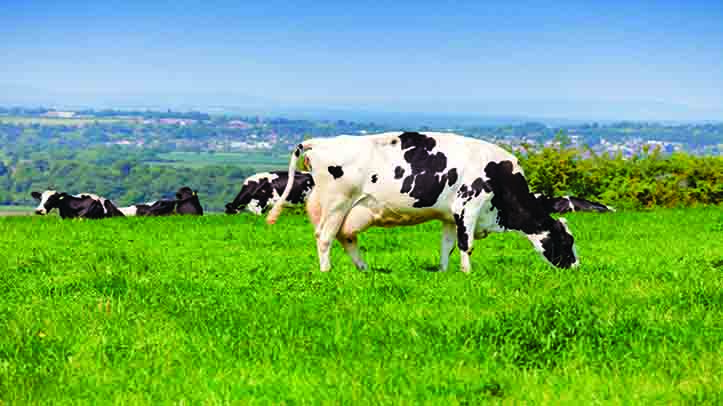For more than 40 years, UFAC-UK has set the pace of innovation in supplements. Simon King headed to Woolfox, Rutland, to hear more about the company from managing director Robert Jones
With environmental responsibility and sustainability at the heart of everything it does, UFAC says it has developed and perfected the science of blending liquid nutrient sources and bonding them into protected matrices.
The result is a range of products specifically designed to enhance the value of livestock. With particular expertise in the use of oils, fats, amino acids and liquid sugars as nutritional supplements, UFAC-UK, at Woolfox since 1979, embraces a partnership ethos.
Managing director Robert Jones said: “We are proud of our heritage, but equally committed to delivering solutions to a dynamic farming industry, based on performance and sustainability, consistently making the difference for the global agri- food sector.
“We use vegetable oils and we also bring in glycerine and cane molasses,” Robert said. “We also bring in fish oil as a straight, which we use in Omega 3 products.
“We’ve also developed a sizeable market for algae oil in the poultry feed market, for production of high omega 3 eggs.”
Major mill upgrades
UFAC-UK recently completed a major upgrade to its unique UK manufacturing facility, enhancing production efficiencies and reducing its carbon footprint, through the use of intelligent control systems.
Headquartered in Newmarket, with production co-ordinated from the dedicated mill site in Woolfox, UFAC-UK has invested significantly in a new, bespoke manufacturing management software system and advanced liquid holding facilities.
Supporting a dynamic operating environment, the improvements not only align with UFAC-UK’s own commitment to responsible production, but also supports the sustainability commitments of its customers and stakeholders.
Completing an 18-month programme of innovation and development across the facility, the latest updates will help meet the growing demand for UFAC-UK’s energy, protein and Omega 3 nutritional products, as well as providing increased capacity for bespoke formulations and new product development.
Richard Jones, UFAC-UK’s commercial manager, who has been overseeing the upgrades, said the main focus has been around sustainability and efficiency, covering everything from the installation of the new storage tanks and IT system, right down to new recycled polymer bags and reduced use of timber pallets on packaging and distribution channels.
Richard said: “The new IT system has had a significant improvement on the flexibility and efficiency of operation, optimising plant utilisation.”
Driving export sales
Robert said that 40% of everything produced at the Woolfox site is exported to 25 countries across Europe, the Middle East and East Asia.
“With the upgrades to our UK production facility, we are perfectly positioned to meet growing UK and international demand, and to further invest in the research and product development that has been the cornerstone of UFAC-UK’s success,” he said.
“We’re currently looking at Australia.
“The UK-Australia Free Trade Agreement came into place on June 1, so we’re quite hopeful that we’ll get some business in Australia for our envirolac product – we’re trying to sign up with an agent out there as a distributor.”
Trials in the field
Robert added: “We currently have a few trials running, where we’re testing blends of amino acids with oils to replace soybean meal.
“We’ve had work done in Ghent University on toxin binders that came out very well.
“Previously, in collaboration with Reading University we conducted studies on efficacy rumen protection of our products. More recently we evaluated a palm-free fat supplement for dairy cows.
“At the moment, we’re running a trial, on behalf of a milk processor, with 10 dairy farms looking at the benefits of envirolac over a calcium soap, in terms of environmental issues.
“The biggest environmental issue as far as the milk processor is concerned is that we can reduce CO2 by about 60% in the product, and 11% on farm.”
Envirolac proven to increase dairy milk yields
Scientists at the University of Nottingham have said a new palm-free fat supplement has the potential to transform the dairy sector and offer a new approach to feeding ruminants.
In a trial project, led by Professor of Dairy Science Phil Garnsworthy, utilising the research capabilities within the Centre for Dairy Science Innovation (CDSI) at Nottingham University, the rumen inert palm-free fat supplement envirolac has been proven to increase milk yields and quality, while offering a lower carbon footprint when compared with a calcium soap fat supplement derived from palm fat derivatives.
The project compared the new palm-free fat supplement, manufactured from locally sourced vegetable oils together with marine oils, against a palm-oil based fat supplement as control.
Professor Garnsworthy said: “The aim of our trial was to demonstrate that envirolac performed just as good as a calcium soap, however, what we actually discovered was that there was a significant increase in milk yield and butterfat production, with no impact on dry matter intake. Overall, we found an increase in feed conversion efficiency.”
Robert Jones added: “Backed by scientific research, we are making breakthroughs in product formulations, removing the need for palm oil and reducing the reliance on soya.
“We are unlocking the door to a more sustainable future that will positively impact the environment while transforming animal health, and increasing performance and profitability.”
The initial results of the trial at Nottingham University indicate a potential financial benefit to the UK dairy herd in excess of £85 million annually, based on the market prices when the research was unveiled, for the products under trial and liquid milk.


